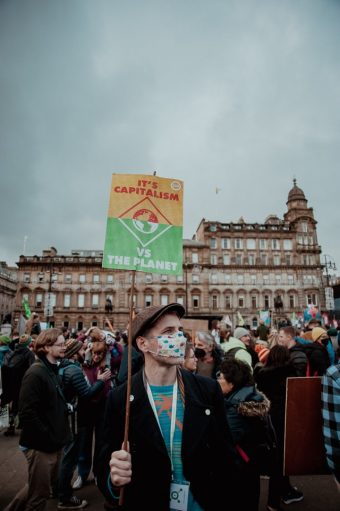
Capitalism: the driving force behind irreversible climate change
Photo by William Gibson on Unsplash
By Lucha Partington Momber
Climate change is undeniably an issue we have to face in contemporary society; “the world has already heated up by around 1.2C, on average, since the preindustrial era” (Milman et al, 2021). This is widely recognised as a large issue, as climate change can magnify and accelerate issues such as extinction and biodiversity loss and has been linked to increased natural disasters such as flooding. There have been many UN climate talks to try and mitigate the issue, such as COP26 and agreements such as the 2015 Paris Climate Agreement have been made. However, despite this, temperatures are still increasing and climate change remains a pertinent issue which is alarming people, particularly younger generations. Recently, there have been increasing levels of
“eco-anxiety” (a chronic fear of environmental decline) which public health experts have said is underestimated and likely to be damaging for people in the long term (Gregory, 2021). It must also be mentioned that capitalism and explosive economic growth is prevalent in current society and the environmental repercussions of this are undeniable. Economic growth generally relies on exploitation of natural resources – for example, the global economy relies heavily on the use of oil which is not sustainable as it is a finite resource, but also fuels climate change as it is a greenhouse gas and releases CO2 when burnt.
While some people would argue that individuals have agency (free will and the power to navigate their life) and can individually combat climate change for example by travelling less and boycotting unsustainable product sand services, climate change is a structural problem (social institutions and the system of capitalism and the value systems and cultural frameworks that creates shapes the way people act). Change should not simply be down to individuals, and due to a competitive capitalism market, many small-scale individual actions aren’t possible for some people – for example buying organic meant is proven to be much better environmentally but this is unaffordable for many people. Furthermore, large corporations are the cause of the majority of carbon emissions – “just 100 companies have been the source of more than 70% of the world’s greenhouse gas emissions since 1988, according to a new report” (Riley, 2017). This demonstrates that climate change is an issue that should be tackled systematically, not something that is up to individuals and their agency.
Marx and Engels refer to capitalism as “the sorcerer who is no longer able to control the powers of the nether world whom he has called up by his spells.”. This means that capitalism can’t control its own consequences and constantly creates further problems instead of solving the ones it creates. Schnaiberg drew upon a Marxist understanding of capitalism to create his influential sociological treadmill of production theory in which he argued that the relentless scaling up and intensification of economic production, linked with investment in changing technologies was directly resulting in increasing resource exploitation, consumption, and pollution (Schnaiberg, 1980). This theory focuses on production rather than consumption as ‘Individuals, communities, states and corporations consume only the outputs of a given production technology… While consumers can accept or reject these products, they have no influence over the allocation of capital to productive technologies.’ (Gould, Pellow & Schnaiberg, 2008: 20). It argues that the production and ecosystem is direct, unlike the consumer and ecosystem relationship.
However, it is arguably not possible to simply dismantle capitalism to mitigate and prevent further climate change – dismantling capitalism would not be an easy process. There would be dispute over what system would replace it, and many members of the public have become accustomed to the simple luxuries and freedom they experience under capitalism such as the consumerist market and the ability to travel. There are some methods proposed that attempt to combat climate change without utterly dismantling capitalism, such as the Green New Deal, which involves fundamentally reforming the capitalist economy with strong environmental guidelines such as investment in green technologies and tougher environmental restrictions on companies.
References
Gould, Pellow & Schnaiberg, The Treadmill of Production, 2008: 20
Gregory, Andrew. “‘Eco-Anxiety’: Fear of Environmental Doom Weighs on Young People.” The Guardian, 6 Oct. 2021,
www.theguardian.com/society/2021/oct/06/eco-anxiety-fear-of-environmental-doom-weighs-on-youn g-people.
Milman, Oliver, et al. “The Climate Disaster Is Here – This Is What the Future Looks Like.” The Guardian, 14 Oct. 2021,
www.theguardian.com/environment/ng-interactive/2021/oct/14/climate-change-happening-now-stats- graphs-maps-cop26.
Riley, Tess. “Just 100 Companies Responsible for 71% of Global Emissions, Study Says.” The Guardian, 10 July 2017,
www.theguardian.com/sustainable-business/2017/jul/10/100-fossil-fuel-companies-investors-respons ible-71-global-emissions-cdp-study-climate-change.
Schnaiberg, Alan. The Environment: From Surplus to Scarcity (1980)

0 Comments